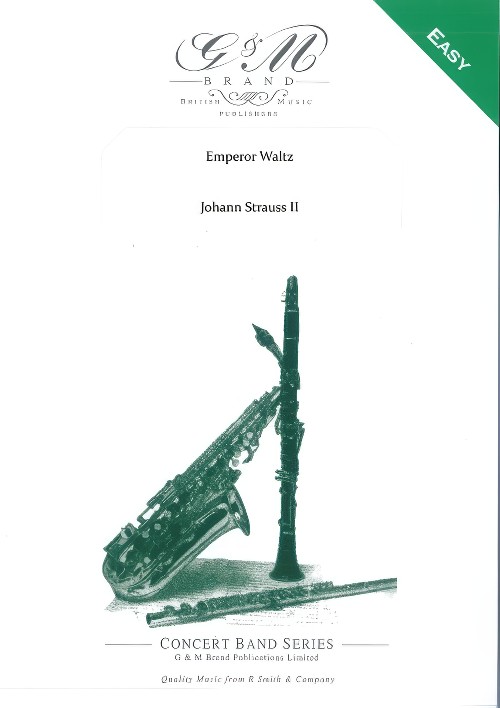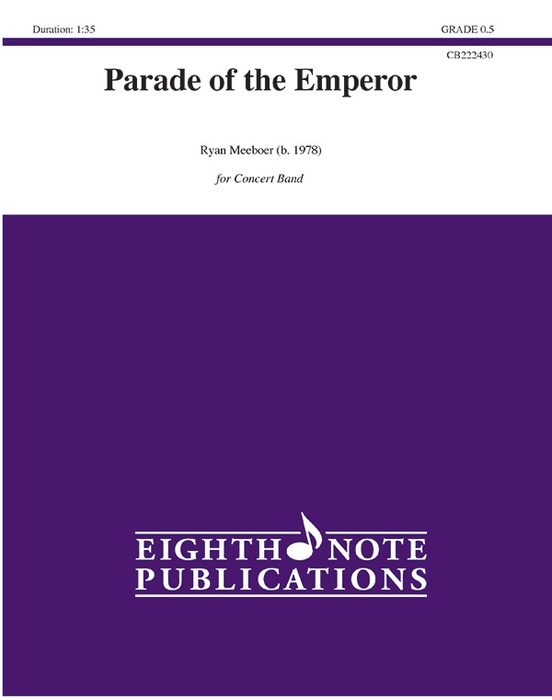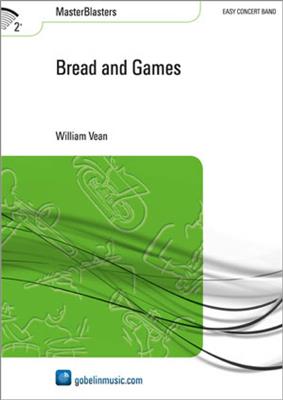Results
-
 £186.20
£186.20 -
 £67.20
£67.20Mummy: The Tomb of the Dragon Emperor Theme - Edelman
Estimated dispatch 7-14 working days
-
 £49.95
£49.95Emperor Waltz (Concert Band - Score and Parts) - Johnson, Stuart
Johann Strauss (the younger) was only six when he wrote his first waltz and it was obvious at an early stage that he would rival and outshine his father. His waltzes were meant for dancing - the opening bar is for partners to bow by way of introduction to each other - and when the "Emporor Waltz" was written in 1888, Strauss was director of the Imperial Court Balls in Vienna.
Estimated dispatch 7-14 working days
-
 £9.95
£9.95Emperor Waltz (Concert Band - Score Only) - Johnson, Stuart
Johann Strauss (the younger) was only six when he wrote his first waltz and it was obvious at an early stage that he would rival and outshine his father. His waltzes were meant for dancing - the opening bar is for partners to bow by way of introduction to each other - and when the "Emporor Waltz" was written in 1888, Strauss was director of the Imperial Court Balls in Vienna.
Estimated dispatch 7-14 working days
-
 £45.95
£45.95Parade of the Emperor - Ryan Meeboer
This piece, influenced by the music of the Orient, was composed using a minor pentatonic scale, and focusing on the first six notes learned in most method books. Following ABA form, this is a perfect opportunity for performers to learn about contrapuntal textures, dynamic contrasts and a variety of articulations, through playing simple, memorable themes. Every instrument in the ensemble gets the opportunity to shine at some point in written by Ryan Meeboer.
Estimated dispatch 3-5 working days
-
 £75.50
£75.50The Dream of Tiberius - David Campo
The Roman Emperor Tiberius was born in 42 BCE to Tiberius Claudius Nero and Livia Drusilla, both descendants of prestigious political families, at a time when Rome was undergoing significant political upheaval. Julius Caesar had begun a brutal civil war in 49 BCE to end Rome's rule as a Republic and consolidate his power as supreme ruler. Following Caeser's assassination in 44 BCE, Tiberius' father backed the forces wishing to return Rome to a Republic, but they were defeated by Caesarian loyalists led by Caeser's heir Octavian. As a result, Tiberius' early life was spent on the run and in political exile with his parents. In 27 BCE, Octavian would become the first Emporer of Rome and assume the name Augustus. Augustus forced Tiberius' parents to divorce and took Tiberius' mother as his new bride, separating the family and forcing Tiberius to live with his father. Upon his father's death, Tiberius went to live with his mother and Emporer Augustus, a situation Tiberius found extremely uncomfortable but one over which he had no control. Having been adopted by the Emperor, Tiberius assumed the military and political life thrust upon him. He proved to be an outstanding military and political leader, and with his marriage to Vipsania Agrippina his life took on a heretofore unknown stability. However, Augustus would intervene in Tiberius' life once more, forcing him to abandon his happy marriage and take Augustus' daughter Julia (Tiberius' step sister) as his new wife. This arrangement, while securing Tiberius' place as Augustus' heir and ensuring he would one day be Emperor of Rome, was disastrous. Julia's drunken licentiousness was a constant source of scandal and embarrassment for Tiberius (and her father, the Emperor) and she was eventually exiled by her father Augustus. Tiberius was named Emperor of Rome upon the death of Augustus in AD 14, assuming his position as the most powerful man on Earth. However, no matter how powerful he had become, Tiberius never felt as if he had ever had any control over his life, having been manipulated from childhood through adulthood by the whims of Augustus. As Emperor, he soon became disgusted with the political intrigue of the Roman Senate and by AD 26 left Rome and took up residence on the island of Capri, where he lived out the rest of his life. History does not regard Tiberius fondly and by all accounts towards the end of his reclusive life on Capri, he had become a miserable, sick and mentally unstable old man reveling in debauchery and cruelty. It is also informative to note that he was Emperor of Rome when Jesus of Nazareth was crucified, and while there is no indication that Tiberius was even aware of the existence of Jesus, as Emperor he was responsible for the appointment of Pontius Pilate as Governor of Judea. Even considering this, it is difficult to look on the life of the Emperor Tiberius and not feel some sympathy and pity. It's in this spirit that I composed "The Dream of Tiberius." I imagine the man sitting in thoughtful seclusion on the beautiful island of Capri imagining what his life might have happily been had not power been thrust upon him: husband, father and humble servant of the people.
Estimated dispatch 7-14 working days
-
 £155.99
£155.99Sisi - Kaiserin von -sterreich - Otto M. Schwarz
Empress Elisabeth of Austria, also known as Sisi, led a fascinating life shaped by external constraints and internal struggles. Born in 1837 in Munich, she became Empress through her marriage to Emperor Franz Joseph I. Despite the highs and lows of her marriage, she bore four children. Sisi's extraordinary beauty and her distinctive fashion sense were as well-known as her longing for freedom, which led her on numerous journeys throughout Europe, with a particular affinity for Hungary. Her relationships with the men in her life, especially Emperor Franz Joseph I. and Count Gyula Andrssy, hold significance. The composition by Otto M. Schwarz explores Sisi's freedom-loving nature and her loves, with the composer incorporating short musical motifs from her era.
Estimated dispatch 7-14 working days
-
£292.00
Marco Polo (French text) - Antonio Rossi
Marco Polo (Venice, 1254), son of Venetian merchants, left in 1271 with his father Niccol and his uncle Matteo, towards the distant China at the court of the Mongol emperor Kublai Khan. The long journey, which lasted three and a half years, led the Polos to cross Turkey, Central Asia, the Pamir, and the Gobi desert. The intelligence of the young Marco and his curiosity towards new customs and languages raises the interest of the emperor so much that he decides to keep him at his court by appointing him ambassador. This assignment takes him to newly conquered southern China and other parts of southern Asia. In 1292, the Great Kublai Khan agrees, albeit reluctantly, to let him go.Marco, after 17 years at his service, can finally return to Venice, but not before completing a last mission for the Grand Khan: accompanying his niece, Princess Kokachin, to Persia, where she would marry. A few years after his arrival in Venice, Marco finds himself involved in a naval battle against the Genoese people in which the Venetians are defeated. Consequently, Marco is captured and taken to prison in Genoa. There, he meets the storyteller Rustichello da Pisa to whom he tells the story of his adventurous journey. After his release, Marco returned to Venice and led a comfortable life until his death in 1324.
Estimated dispatch 7-14 working days
-
£202.99
The Spiked Wheel - Tom De Haes
The legends surrounding Saint Catherine of Alexandria, also known as the Great Martyr Saint Catherine, were the source of inspiration for this work. It depicts events surrounding her life in five musical episodes. The first episode presents the Emperor's procession and theme. All is well until a heathen sacrificial ritual is heard in the second movement. After the sacrifice, Catherine and her lyrical, reflective theme make an appearance. A dispute breaks out between Catherine and the Emperor, which can be heard in the heated exchange between their respective themes. Catherine is sentenced to die by the breaking wheel. The voices of angels can be heard in the finale, asCatherine ascends to heaven.
Estimated dispatch 7-14 working days
-
 £84.99
£84.99Bread and Games - William Vean
'Panem et Circenses', Bread and Games were essential for keeping the citizens of ancient Rome in check. While the bread was meant for the poorest among the Romans, the Games were Popular Pastime Number One for everybody.There were different kinds of games, such as chariot races (especially popular with female spectators), or wild-beast fights, where lions, tigers, bulls or bears were set on one another or even on human beings. Most popular, however, were the Gladiator fights. In 'Bread and Games' William Vean depicts one of the many fights in the antique Colosseum. 1. Entrance of the Gladiators: By powerful bugle-calls the attention of the peoplewas asked for, after which the Gladiators entered the Arena at the sound of heroic marching-music.2.Swordfight: We can hear that the fights were not mere child's play in this part.On the contrary, they were a matter of life and death and were fought accordingly.3.Mercy of the Emperor: Sometimes a wounded gladiator could be fortunate, depending on the mercy of the audience. Waving one's handkerchief meant mercy, a turned-down thumb meant no pardon. The Emperor had the right to take the final decision, but he usually complied with the wish of the majority of the public. 4.Lap of Honour: Gladiators were mainly selected among slaves, convicted criminals, or prisoners of war. Consequently, winning was very important, as it would mean fame, honour and sometimes even wealth. A lap of honour, therefore, was the winner's due reward.
Estimated dispatch 7-14 working days
